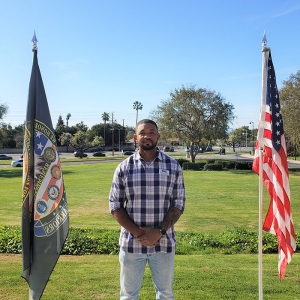Veteran Student is Learning about Himself, Healing Others through Military Social Work
February 03, 2020 / by Constance Sommer- MVP
- Students
Jeramie Jackson, a third-year student at the USC Suzanne Dworak-Peck School of Social Work, will complete his Master of Social Work (MSW) this spring, specializing in social change and innovation on the military social work track.
His decision to enroll in this track was triggered by a mental health crisis he witnessed as an officer in the Army. Upon graduating, Jackson plans to pursue work at a veteran’s resource center within a university campus, providing counseling services to fellow veterans pursuing higher education.
USC Suzanne Dworak-Peck School of Social Work: How was your decision to pursue a career in social work influenced by your experience in the military?
Jeramie Jackson: As a leader in the military, you are in essence a social worker. You guide and counsel them on everything that goes on in their lives. But―you’re doing this without any training, any understanding of the theories social workers use when they are engaging with clients. While I was transitioning out of the military, I spoke with a retired lieutenant colonel and told him how I loved working through problems and troubled times with my soldiers. He said, “You sound like you were doing exactly what my wife was doing.”
I said “What’s that?”
He said, “Social work.”
USC: Without breaking any confidences, can you share a story from your time in the military that crystallized this passion for you?
JJ: There is one story that is always fresh in my mind. So, soldiers―they’re 18-years-old, fresh out of Mom and Dad’s house. They don’t always think logically. They are very quick and impulsive.
One soldier of mine wanted to get out of the barracks, so he up and married a woman he barely knew. The union was plagued with troubles from the beginning―issues with finances, infidelity and domestic violence. It impacted his ability to do his work, and just his overall mental fitness. Eventually, as his commanding officer, I had to step in and remove him from the home, but his mental state continued to get worse and worse.
It was always in the forefront of my mind―how did this escalate so quickly? Now, after what I’ve learned in the social work program, I get it: instead of sitting the soldier down and discussing things with him, we made decisions for him. We took his power away. In doing that, we made him dependent on our decisions. Later, when we told him to just go deal with it, he didn’t know how to deal with it.
USC: Having trained as a social worker, how do you view your role differently?
JJ: I was so wedded to the military belief that you can fix yourself. You just grab yourself up by the bootstraps and go forward. Now I understand that some people really need a little assistance and, when it comes to family situations, just an ear for someone to listen and not judge them. I was very judgmental. I was like, if I can get through it without help, so can you. Going through this course, it helped me realize that is not conducive to healing.
USC: How do you hope to apply the skills that you have gained during your field placements to your career in social work?
JJ: My most recent internship is at the Veteran’s Resource Center at Ventura Community College, near where I live. I’m trying to help the center expand and improve its offerings. For instance, the center here opened in 2015, but they still don’t have individual counselors that are strictly for vets. They don’t have peer mentors to help veterans navigate through the college process. They are lacking in veteran specific tutors. My job is to start working on making those things happen.
I want to continue this work when I graduate. I’d like to go to another college, one that doesn’t have a veteran’s resource center, and build it from the ground up. It’s hard, coming out of the military into civilian life. I want to make sure that veterans can have the help and support they need when they walk back onto a campus.
USC: What advice would you give other military members considering getting a master’s in social work?
JJ: Go in with an open mind. You’re going to learn so much about yourself.
To reference the work of our faculty online, we ask that you directly quote their work where possible and attribute it to "FACULTY NAME, a professor in the USC Suzanne Dworak-Peck School of Social Work” (LINK: https://dworakpeck.usc.edu)
